“Is Salmon Good for Weight Loss?” In the quest for effective weight management, salmon stands out. This nutrient-rich fish, thriving in the frigid waters of the Atlantic and Pacific, offers more than flavor.
It’s a key player in weight loss, packed with protein, omega-3 fatty acids, and vital nutrients. Let’s explore how salmon can be an integral part of your weight loss diet.
Read more
- Is Collard Greens Good for Weight Loss? Nutritional Information.
- Do Carrots Help You Lose Weight? The Superfood Secret.
- Are Brussels Sprouts Good for Weight Loss? Diet Benefits.
Does Salmon Help You Lose Weight?
When it comes to shedding those extra pounds, salmon can be a valuable addition to your dietary arsenal, but it’s essential to remember that it’s not a magical solution on its own.
Salmon is a protein-rich superstar, and protein plays a pivotal role in weight loss. Here’s how it works: Protein takes longer to digest, making you feel full for extended periods. As a result, you are less likely to indulge in unnecessary snacking or overeating. This is particularly beneficial for those looking to reduce calorie consumption.
Salmon also boasts a generous supply of omega-3 fatty acids. These essential fats not only promote overall heart and brain health but can also aid in your weight loss journey. How? Omega-3s enhance insulin sensitivity, which means your body can better regulate blood sugar levels. This can reduce cravings for sugary or high-carbohydrate foods, helping you stay on track with your weight loss goals.
While salmon’s protein and omega-3 content make it an excellent choice for weight-conscious individuals, it’s crucial to understand that simply devouring salmon won’t magically melt away the pounds. Weight loss fundamentally boils down to a simple equation: burning more calories than you consume. Salmon can certainly support your efforts, but you need to be mindful of your overall calorie intake and portion sizes.
To harness the potential benefits of salmon for weight loss effectively, it should be integrated into a comprehensive, balanced diet. Pair it with an array of vegetables, whole grains, and lean proteins, and complement your dietary choices with regular exercise.
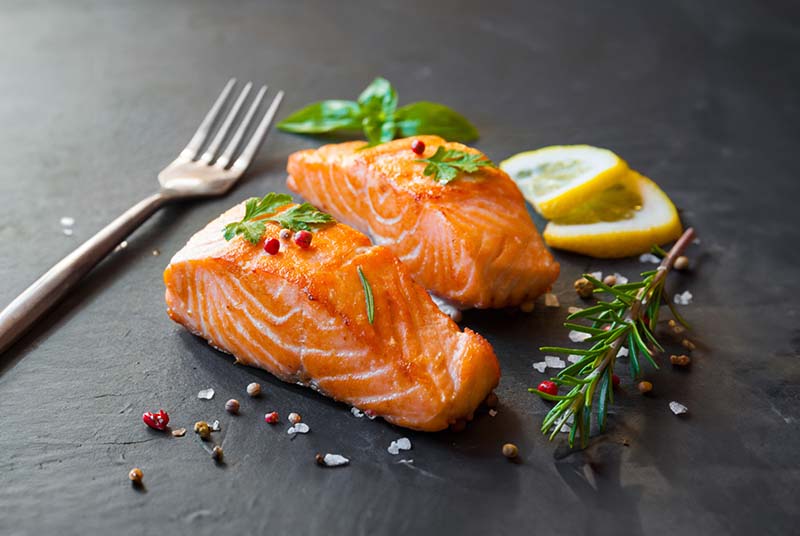
Salmon and Its Impact on Weight Management
At first glance, the notion of including salmon in a weight loss regimen might seem counterintuitive due to its reputation as a fatty fish. However, it’s time to set the record straight: salmon can indeed be a valuable asset on your path to weight management.
Calorie Considerations
Let’s begin by addressing the calorie myth. A typical serving of salmon contains just over 200 calories. While this may seem like a lot, remember that calories alone don’t tell the whole story. When embarking on a weight loss journey, the key is to cultivate a well-rounded, health-supporting diet, and this is where salmon shines. It offers an array of benefits that extend far beyond its calorie content.
Nutrient Powerhouse
Salmon is a nutritional powerhouse. It’s not just about the calories; it’s about the quality of those calories. Here’s why salmon deserves a place in your weight loss meal plan:
- Protein Prowess: Salmon boasts a significant protein punch. Protein is your ally when it comes to sustainable weight loss. It helps you feel fuller for longer, curbing those between-meal cravings and reducing overall calorie intake.
- Omega-3 Marvel: Salmon is a rich source of omega-3 fatty acids. These healthy fats not only support heart and brain health but also play a role in optimizing your weight loss journey. They improve insulin sensitivity, potentially reducing your desire for sugary or high-carbohydrate foods.
- Nutrient Bounty: Beyond protein and omega-3s, salmon offers an array of essential nutrients, including vitamins like B12 and D, selenium, and iodine, which contribute to your overall well-being.
The Sustainable Solution
When you incorporate salmon into a balanced weight loss meal plan, you’re not just counting calories—you’re investing in your health. To make this endeavor even more convenient, consider the support of a trustworthy weight loss meal delivery service. These services can provide you with a variety of nutritious meals featuring salmon, ensuring that your weight loss journey is not only effective but also sustainable in the long run.

Nutritional Profile of Salmon
Salmon, a true nutritional powerhouse, offers a spectrum of health benefits that can vary slightly between farmed and wild-caught varieties. Understanding the nuances of their nutritional profiles can help you make informed dietary choices.
Macronutrient Breakdown:
- Wild Salmon: A 3.5-ounce (100-gram) serving of cooked wild salmon provides around 182 calories, 25 grams of protein, and 8 grams of healthy fats.
- Farmed Salmon: On the other hand, farmed salmon comes in at approximately 206 calories, 22 grams of protein, and 12 grams of fats for the same serving size.
Vital Vitamins
Both wild and farmed salmon offer a wealth of essential vitamins:
- Vitamin B12: A standout nutrient in salmon, both types provide a substantial amount. Wild salmon provides 127% of the Daily Value (DV), while farmed salmon offers 117% of the DV. Vitamin B12 is crucial for red blood cell production and central nervous system health.
- Vitamin B6: Wild salmon provides 56% of the DV, and farmed salmon provides 38% of the DV. This vitamin plays a role in various bodily functions, including metabolism.
- Niacin (Vitamin B3): Wild salmon contains 63% of the DV, while farmed salmon has 50% of the DV. Niacin supports overall health and well-being.
- Pantothenic Acid (Vitamin B5): Wild salmon supplies 38% of the DV, while farmed salmon offers 30% of the DV. This vitamin is essential for energy metabolism.
- Thiamine (Vitamin B1): Wild salmon contributes 23% of the DV, while farmed salmon provides 28% of the DV. Thiamine is vital for carbohydrate metabolism.
Critical Minerals
Both types of salmon are rich in important minerals:
- Selenium: Wild salmon contains 85% of the DV, and farmed salmon provides 75% of the DV. Selenium plays a crucial role in DNA synthesis, thyroid hormone regulation, and reproductive health.
- Phosphorus: Wild salmon offers 21% of the DV, while farmed salmon supplies 20% of the DV. Phosphorus is essential for bone health and many physiological processes.
Omega-3 Fatty Acids
Salmon, whether wild or farmed, is a standout source of heart-healthy omega-3 fatty acids. These fats are renowned for their ability to reduce inflammation and promote brain health.
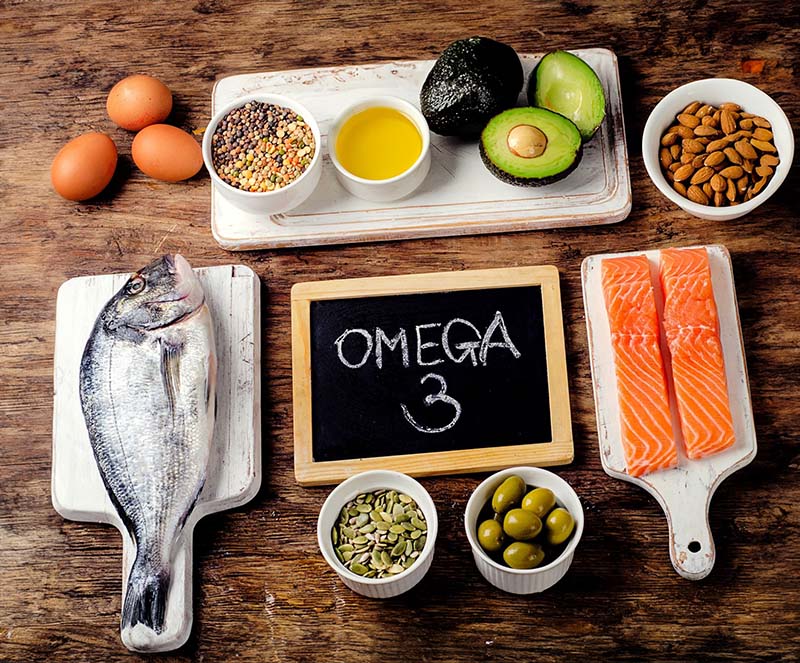
Health Benefits of Salmon
Salmon is a true nutritional treasure trove, offering an array of health benefits that can enhance your overall well-being. Let’s delve into the many advantages of incorporating salmon into your diet.
Provides High Quality Protein
Salmon is a rich source of high-quality protein, a fundamental nutrient for various vital functions in your body. Protein aids in post-injury healing, supports bone health, and preserves muscle mass, making it indispensable during weight loss and aging.
Helps Lose Weight
Regular consumption of salmon can be effective in weight loss and its maintenance. Its high protein content regulates appetite-controlling hormones, leading to a feeling of fullness. Moreover, the metabolic rate increases more after eating protein-rich foods like salmon.
Omega-3 fats in salmon, particularly in active lifestyles, may further assist in reducing belly fat. Studies, including one on children with nonalcoholic fatty liver disease, show that DHA (a key omega-3 in salmon) significantly reduces liver and belly fat.
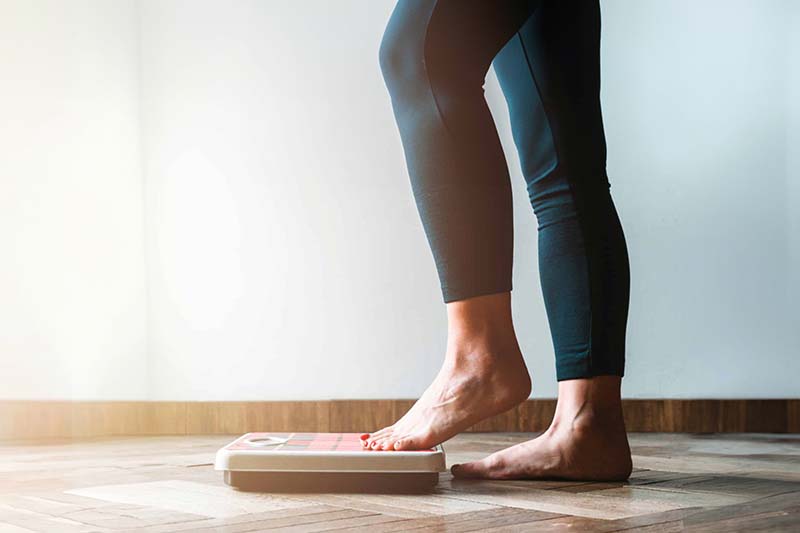
Rich Source of Omega-3 Fatty Acids
Salmon stands out as one of the best sources of essential long-chain omega-3 fatty acids, including eicosapentaenoic acid (EPA) and docosahexaenoic acid (DHA). These fats offer a multitude of health benefits, such as reducing inflammation, lowering blood pressure, and enhancing arterial function.
Rich in Micronutrients
Salmon isn’t just about macros; it’s also rich in essential micronutrients. It’s particularly abundant in B vitamins and selenium, a potent antioxidant vital for overall health.
Possesses Antioxidant and Anti-inflammatory Qualities
Salmon’s impressive antioxidant and anti-inflammatory properties extend beyond omega-3 fats. Astaxanthin, the compound responsible for salmon’s pink hue, adds to its protective capabilities, safeguarding the body against oxidative and inflammatory damage.
Convenient Option
Salmon offers convenience and versatility in the kitchen. Its delectable, mild flavor makes it appealing to various palates. You can prepare it in numerous ways, from grilling and baking to sautéing and smoking. Canned salmon is also a cost-effective option with the same nutritional benefits as fresh fish.
How Often Should You Eat Salmon for Weight Loss?
Determining how often to include salmon in your diet for weight loss depends on various factors like your daily calorie requirements, dietary preferences, and overall meal plan. Here’s a general guideline to help you make informed choices:
- Frequency: Aim to include salmon in your diet 2-3 times a week. This frequency strikes a balance between reaping the benefits of its protein and healthy fats while ensuring you don’t go overboard on calories.
- Portion Size: Each serving of cooked salmon typically weighs around 3-4 ounces (85-113 grams). This portion size provides an ample amount of protein and essential fats without significantly spiking your calorie intake.
- Variety is Key: While salmon can be a star player in your weight loss journey, it’s essential to maintain dietary diversity. Combine it with an array of other nutrient-rich foods like vegetables, whole grains, and lean proteins to create a balanced and calorie-controlled meal plan.
- Individual Considerations: Keep in mind that individual calorie needs vary. Factors such as age, gender, activity level, and weight loss goals play a significant role in determining your specific dietary requirements. Consulting with a registered dietitian can help tailor a salmon-centric plan that aligns with your unique needs.
- Sustainable Choices: Make sure your dietary choices are sustainable over the long term. Salmon is an excellent addition to your weight loss plan due to its nutritional benefits, but it should fit comfortably into your lifestyle and preferences.
- Preparation Matters: Pay attention to how you prepare your salmon. Opt for healthier cooking methods like grilling, baking, or steaming to minimize added calories from oils or sauces.
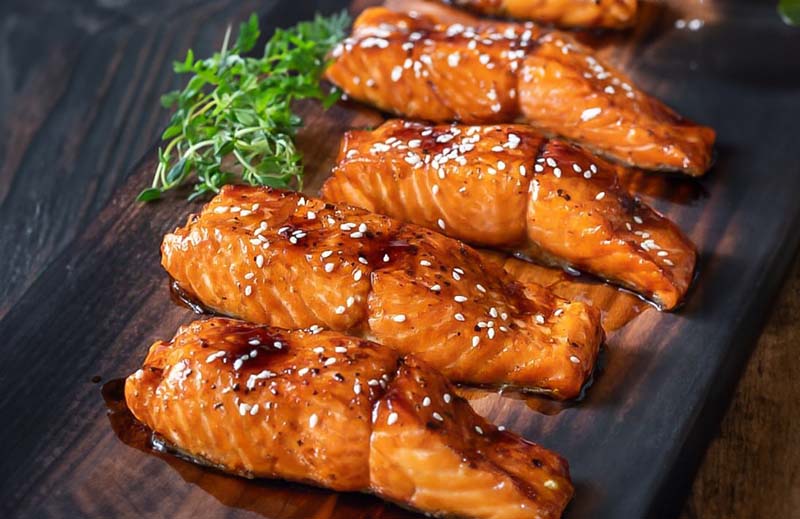
What Are the Side Effects of Eating a Lot of Salmon?
While salmon is undoubtedly a nutritious food choice, consuming it excessively can lead to certain side effects and health concerns. Here’s a closer look at potential issues associated with overindulgence:
Mercury and Pollutant Exposure
- Mercury Accumulation: Salmon, especially larger and older fish, may contain elevated levels of mercury and other pollutants. Excessive consumption can lead to the accumulation of mercury in your body, potentially causing health problems.
- Contaminants in Farmed Salmon: Farmed salmon, in particular, can contain higher levels of contaminants such as PCBs (polychlorinated biphenyls). These substances may pose health risks when consumed in excess.
Omega-3 and Omega-6 Imbalance
- Fatty Acid Disproportion: Salmon is rich in omega-3 fatty acids, which offer various health benefits. However, excessive consumption without a balanced intake of omega-6 fatty acids can lead to an imbalance between these essential fats.
- Inflammatory Potential: An imbalance between omega-3 and omega-6 fatty acids may promote inflammation in the body, potentially increasing the risk of chronic diseases.
Recommendations for Safe Consumption
- Moderation is Key: To mitigate these risks, it’s essential to consume salmon in moderation. Following general dietary guidelines of 2-3 servings per week is a prudent approach.
- Choose Wisely: Opt for wild-caught salmon when possible, as it tends to have lower levels of contaminants compared to some farmed varieties.
- Diverse Diet: Maintain a varied diet that includes other sources of protein and healthy fats to ensure a well-rounded nutritional intake.
- Consult a Professional: If you have specific dietary concerns or health conditions, consider consulting with a healthcare professional or registered dietitian for personalized guidance.
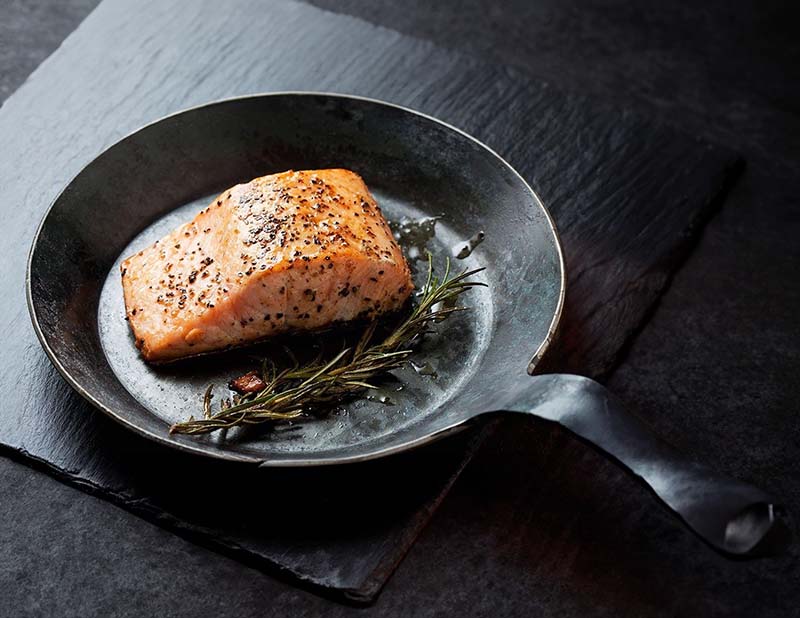
Is Canned Salmon Good for Weight Loss?
Canned salmon can indeed be a valuable addition to your weight loss journey. It retains much of the protein content found in fresh salmon. However, the levels of omega-3 fatty acids may vary slightly due to natural differences in salmon muscle.
Keep in mind that the thermal processing of canned salmon can result in a depletion of some micronutrients, making certain varieties potentially less beneficial for weight loss compared to fresh salmon. Nevertheless, it remains a convenient and nutritious option, especially when fresh salmon is not readily available.
Is Smoked Salmon Good for Weight Loss?
Smoked salmon can be a weight loss-friendly choice due to its low calories content and high protein levels. The protein in smoked salmon helps you feel full for an extended period, reducing the likelihood of overeating.
Additionally, it may have a metabolism-boosting effect, making it easier to shed extra pounds. However, it’s essential to consume smoked salmon in moderation, as it can also be high in sodium, which could lead to water retention if consumed excessively.
Is Raw Salmon Good for Weight Loss?
Raw salmon, such as the type used in sushi and sashimi, offers a wide array of nutritional benefits for weight loss. It’s an excellent source of high-quality protein, which supports sustainable weight loss by promoting satiety.
The raw form preserves the essential nutrients, including omega-3 fatty acids, making it a superb choice for those seeking to manage their weight effectively.
Conclusion
In summary, the answer to “Is Salmon Good for Weight Loss?” is a definitive yes. Salmon is not just a tasty choice but a strategic ally in weight loss, thanks to its high protein and omega-3 content.
Share your salmon stories with us at SureLifeHealth and explore more about how this and other superfoods aid in achieving a healthier lifestyle.
Professor Gaye Cunnane, PhD, MB, FRCPI
As the Director of Health and Wellbeing at RCPI, Professor Gaye Cunnane is at the helm of initiatives aimed at enhancing the health and well-being of RCPI Trainers and Trainees. Her role extends beyond administration; she is also a respected clinical professor of rheumatology and a consultant rheumatologist at Trinity College Dublin (TCD) and St James’s Hospital. Prof. Cunnane’s medical journey began at TCD, where she graduated from medical school, and her path has been marked by both clinical and academic excellence.
After completing her basic clinical training in medicine, she embarked on PhD studies at University College Dublin and St Vincent’s University Hospital. Her research during this period was focused on prognostic markers in early inflammatory arthritis, a project that saw her collaborating with esteemed universities across Europe, including in Switzerland, The Netherlands, the UK, and Sweden.
Prof. Cunnane’s career took her to the University of California, San Francisco, where she spent three years delving into research on new treatments for lupus. Her academic prowess led her to the University of Leeds in 2001 as a senior lecturer, before returning to Ireland in 2003 to assume her current roles. She has also served as the National Specialty Director for Rheumatology training in Ireland, Programme Director for Basic Specialist Training with RCPI, and as a past President of the Irish Society for Rheumatology.
PUBLISHED ARTICLES
“Rheumatic disease differentiation using immunoglobulin G sugar printing by high-density electrophoresis”: Published in The Journal of Rheumatology, this study reflects her in-depth investigation into rheumatic diseases.
“Benefits of exercise in patients with rheumatoid arthritis: a randomized controlled trial”: This research work, highlighting the positive impact of exercise on rheumatoid arthritis, underscores Prof. Cunnane’s dedication to practical, patient-centered research.
Additionally, Prof. Cunnane has made notable contributions to the Annals of the Rheumatic Diseases, discussing early referral, diagnosis, and treatment of rheumatoid arthritis. She has also been involved in a study on the NCBI platform investigating exercise benefits in rheumatoid arthritis patients.
Professor Gaye Cunnane’s career is a testament to her commitment to improving patient outcomes in rheumatology through rigorous research, clinical excellence, and dedicated teaching. Her work continues to influence the field of rheumatology, both in Ireland and internationally.

